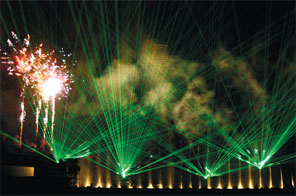Messy Dhaka SAG: Best outing for Nepal
KATHMANDU: The Nepali contingent returned from what it eventually became one of the most successful regional meets in foreign soil, after participating at the 11th South
Asian Games held in Dhaka from January 29 to February 9.
Nepal won eight gold, nine silver and 20 bronze medals to finish fifth in the medal tally where India as usual dominated the Games winning 90 gold, 71 more than the second placed Pakistan. The 11th SAG became the most successful regional meet for Nepal in terms of gold medal. Earlier, the most successful outing for Nepal was the 10th SAG in Colombo with seven gold medals.
Also, it was the best performance from the Nepali contingent among the three editions of Games held in Bangladesh. Nepal had won one gold each in the second edition in 1985 and sixth edition in 1993 hosted by Bangladesh.
Taekwondo ace Deepak Bista achieved the milestone of winning four consecutive gold medals. Deepak started his winning campaign from 1999 Games in Kathmandu and remained undisputed across the region clinching other two in 2004 in Islamabad and in 2006 in Colombo.
Before the Games, the Beijing Olympian was tied with legendary marathoner Baikuntha Manandhar with three consecutive gold medals. He also became the first player to win four straight gold medals.
Rajendra Bhandari gave an emphatic return winning marathon gold on the last day of the Games, erasing the bitter experience of the 10th SAG where he was stripped of the 3,000m steeple chase and 5,000m gold medals for doping offence. Martial Arts once again saved nation from blushes, winning seven out of eight gold medals. Nepal won two gold medals each in wushu and taekwondo while Karate became the most successful sport winning three gold, two silver and two bronze medals.
Wushu player Binita Maharjan scripted the first gold in Nepal’s tally that remained barren till the ninth day. Ang Babu Lama brought another wushu gold. Sunil Lama, Binod Shakya and Ganga Adhikari clinched karate gold, while Ayesha Shakya brought the second taekwondo gold on the day when Nepal won five gold medals.
Judo became the most successful sport for Nepal in terms of participation after the seven-member team was left tottering by a lift mishap. Nepal succeeded to winfour bronze medals out of the five participants after Kaluman Tamang and Ramesh Magar had to pull out following the mishap. Debu Thapa, who was advised by the doctors to pull out, braved her injury to win a bronze medal.
Nepali table tennis also got revived after Muna Basukala brought the first singles bronze medal for Nepal in 19 years. Women’s footballers surprised all by winning the silver. Nepali skipper Jamuna Gurung struck the first international hat-trick and Anu Lama brought the other.
The 11th SAG also showed the decline of the champions where the 10th SAG gold medallists — lifter Kamal Bahadur Adhikari, karateka Kushal Shrestha and taekwondo player Manita Shahi — faltered. While Manita won silver and Kushal got bronze, Kamal was disqualified. The whole of the weightlifting team returned empty handed for the first time in regional meet history. Out of the 23 disciplines, 11 failed to produce any medal.
Nepal also got victim of the own disputes and organisers’ blunder.
Kabaddi officials humiliated the entire nation on foreign soil when the coaches and players almost manhandled Nepal Kabaddi Association President Sunil Raj Rajkarnikar following his authoritarian behaviour. Nepal lost a certain women’s team kata bronze medal after chief coach Hira Singh Dangol and team manager Singha Bahadur Rana disputed on over the selection of a kata player, which later resulted into the disqualification of the team.
The blunders from the organising committee also infuriated the Nepali camp. As a result of negligence from Nepali sports authorities, the organising committee twice played the old national anthem in Dhaka.
In another instance,
the national flag of Nepal was hoisted upside down at the handball court at the Bangabandhu National Stadium.
Athlete Rajendra Bhandari couldn’t remain untouched by the controversy yet again after he won marathon gold medal in a shortened course. Rajendra completed the marathon in one hour 59 minutes and 42 seconds but it was later revealed that the organisers’ blunder made all the athletes run at least five kilometres short for an international standard of 42.195km.
The Games ended with spectacular closing ceremony promising to meet in India after two years.






